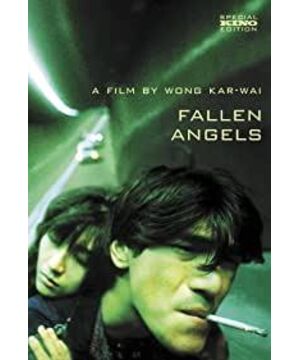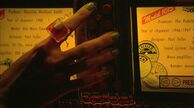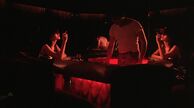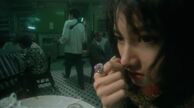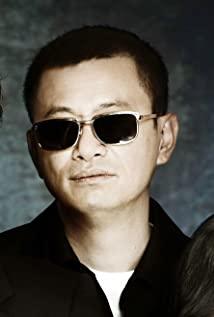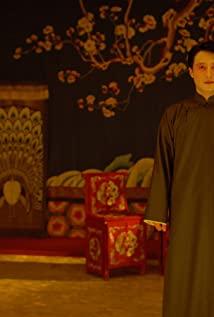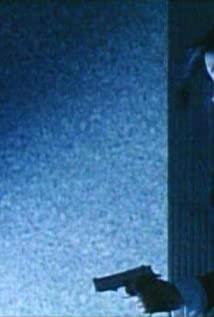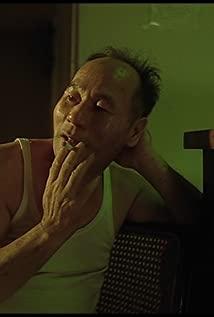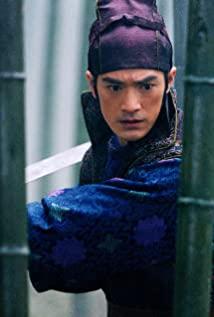that Jin Chengwu's surname is not Jin Cheng. In the class after the performance, Ge Dawei showed us Chen Kexin's "Martial Arts", in which Jin Chengwu is a suspicious catcher. With a Sichuan accent, "Is it something that can't be hacked?" It's really funny. The team leader said that Takeshi Kaneshiro is responsible for laughing in many films. I remembered that the dumb He Zhiwu in "Fallen Angels" had a delicate emotional scene with his father, so I put the re-watching on my first schedule when I came back.
After watching it again, I was very impressed. Especially after I studied film for three years, the number of viewers exceeded 700, and I participated in a lot of short film productions. I began to understand why the masters were called masters, and what their films were telling; my eyes were a little brighter and I saw more details.
It's a bit slow, but now I'm going to learn something from the film.
The first shot of the soul shot
is particularly important, especially for non-linear films. The shot placed in the first shot is probably the focus of the entire film.
presents complex personal feelings, which can be said to be the theme of the film or not. Does a film really have a theme? Maybe not. I think Wong Kar-wai didn't deliberately talk about a certain theme, but returned to human emotions and turned it into a feeling. Can make the whole film convey a feeling, that is, a personal style.
"Fallen Angel" is a mid-stage Wong Kar-wai film. It is no longer the single-line narrative of "Mong Kok Carmen" and "The True Story of Ah Fei". Compared with the two-line narrative of "Chongqing Forest", the story of "Fallen Angel" has more interweaving, making the more ambiguous. Of course, the most ambiguous "2046" went to the extreme, and when it came to the future, it probably reached a peak. The following "The Grandmaster" continues the martial arts style of "Evil in the East and Poison in the West", as if to open up another territory.
In the shooting, the day was abandoned, only the night was left, and only the last shot came to the early morning. I don't understand why the film is called "Fallen Angels", because the Angel of the Night has fallen? But these five characters can't be called angels at all, what the meaning is, I don't know. Forget it, I guess everyone thought the name was pretty cool at the time.
However, shooting at night is easier to control. Compared with relying on the sky to eat during the day, the light source at night is better controlled and the dependence on the weather is reduced. But in the past three years, I haven't filmed a big night drama, and I have followed. First, the lighting is too poor, natural light all year round, relying on the sky to eat, God also appreciates face. Countless nights in my room, keeping clips.
Liming's character is ruthless. In the first few confessions, he says that people's emotions are difficult to control, which shows that he is a person with suppressed emotions. There are many such people in Wong Kar Wai's films. Cold, cool, living in loneliness, do not contact people, avoid them.
Depiction method: talk less, look nervous, smile at others, politely avoid
The way the narration is connected is also very interesting. After the words that can best describe the supporting role, the businessmen with good face are all displayed. After that, Liming cherished his words like gold, and the narrator explained his psychological activities in a petty bourgeois tone, which complemented each other.
Li Jiaxin used a similar editing method to organize the room twice, organized the sequence, cut a scene of dawn, organized the same objects, and cut a group of scenes of dawn. The difference was that before dawn was at the subway station, and then at the airport.
There is also an ambiguous place. At the subway station, Li Jiaxin's action trajectory appears first, and then Dawn's action trajectory appears. Li Jiaxin's action trajectory is basically the same as Li Jiaxin's. The trajectory of action imitated Li Jiaxin, but the unpacking later told everyone that it was the opposite: Li Jiaxin deliberately imitated Dawn.
The second detection point and the killing action were mixed together, and there were several staggered montages that were deliberately ingenious, and the other party was deliberately placed in the direction of the pilot, as if the two were in the same time and space. Similar characters appear. Skilled, well edited, and a wonderful paragraph.
The most characteristic is that the camera uses reverse motion for the shots that dawn in and out.
The photography style of this scene is staggered. The interlacing of people and the movement of the camera highlights the blurred sense of distance between the two people.
Two small wearing scenes
and then Li Jiaxin was tired and planned to wash his hands in a golden basin and leave Li Jiaxin. I met Karen Mok on a rainy night. There is a transition shot in the room, and it’s also a crossover shot, but it has to be used, because this is the most critical emotional change shot, and I think it’s handled very cleverly. Through a look up at dawn, Karen Mok changed from a carnival to a lonely, wry smile, which was deeply unforgettable. It's a pity to wear it.
There's also a dressing
There is a head in the background, which can be explained as a passing person, but based on my experience on the set and the perception of this group of shots, there should not be a superfluous person here, and it is usually a staff member wearing a hat, because there is not much effort shampoo. This buddy should be a radio or field service, and the camera flashed by, and it is estimated that it is within the range of Wong Kar-wai.
"Chongqing Forest" Takeshi Kaneshiro and Wong Kar-wai collaborate for the first time. One of the 223 mentioned by Takeshi Kaneshiro here is the police number of Tony Leung Chiu Wai in "The Forest". Movie fans who are familiar with Wong Kar Wai know that the canned pineapples in the back are also, as well as the setting of Yang Cai Ni's flight attendant. It shows that Wong Kar-wai wants to turn these two films into a continuation, and the shooting style is obvious, as if a familiar smell will make people approach by smelling it.
The most ambiguous place is May 30, and "Chongqing Forest" is also May 30. Takeshi Kaneshiro received a happy birthday.
It's not a hassle for Wong Kar-wai when things are intertwined
, and the places that can be reused are not new restaurants, pork shops, etc. One space and two contexts
, Jin Maoling, is an illusion pursued by Yang Caini, which probably does not exist in the text. After talking for a long time, it has become far and near.
Jin Chengwu really turned into a golden retriever, and when he called, it was also Jin Maoling. Jin Maoling became a point of intersection between the two people. Jin Chengwu liked Yang Caini, so he strengthened the symbol of Jin Maoling and reflected it on him.
There is no light on Jin Maoling's face, you don't need to see who he is, it's just an image.
Personally, I like that part of the pitch. Yang Caini went for her ex-boyfriend, and Jin Chengwu thought that Yang Caini asked him out. The mental state of the two is clear at a glance.
There are some empty shots in the stadium. One of the subjective test points moved a little bit, but they were cut together quite smoothly, and the stadium lights were turned off.
In fact, the story lines of Liming and Takeshi Kaneshiro are basically similar. When they encounter setbacks, they make changes. The setting of the two people is really similar. Takeshi Kaneshiro is a mute, why is he a mute, and the Maggie Cheung killer in "The Forest" is in a different context of dealing with people of various nationalities. The entire context of "Fallen Angel" is Cantonese, It is better to let Taiwanese Takeshi Kaneshiro not speak and monologue in Mandarin. In fact, Dawn is also considered a half mute, and basically does not speak. The two of them are really similar in setting, except that one is flamboyant and the other is restrained. Li Ming was injured and had to wash his hands in a golden basin; Takeshi Kaneshiro lost his love and stopped being the owner of other people's stores, and worked by himself. At this moment, two frustrated people met. Probably homogeneous.
The difference between the two people in the scene is that they fight with people. The first of the two Jinchengwu is the appearance of Jin Maoling, and the last. You will find that everything is chaotic to the extreme, including the fantasy in front of the water tank, and the background is also chaotic to the extreme. On the other hand, Dawn was neat and tidy, and it was solved with a few shots. Even if it was a tail, the contrast between the two was obvious.
The song "Forget Him "
in "Forget Him" made Li Ming feel that he could not escape. Mirror shooting, everything becomes ambiguous again.
The reason is, two women meet. Before meeting, I thought Karen Mok was actually Li Jiaxin before she had long hair. There are some vague things about the two, like the hostile eyes after the two met. It can be said that it is for a man, or it can be said that the two are originally similar. A kind of hostility toward those who are like oneself.
Finally, let's analyze the parent-child scene between Takeshi Kaneshiro and his father. It's simple but in place.
The music is full pad, and it ends before the fall. The music brings out the general feeling, and the other half is the design of the play. Dad was tired of it at the beginning and liked it later. It was a feeling of opening the door in his heart. Through the confession of Takeshi Kaneshiro, he got up and watched, birthday, everything that happened in a short period of time. Get explained, digest quickly. This play between father and son is in the right place.
The photography style is old-fashioned
. After researching the film, I returned to the lens
. The lens is below 35mm, a lot of large wide-angle is about 20mm, ultra-wide is about 14mm, occasionally 85mm, 50mm is basically not seen
Photography style, moving in the opposite direction with the characters, rotating at a wide angle, often used when editing.
There are also more important black and white lenses, which are generally used interspersed. A group of color lenses is connected to one or two small black and white lenses and then a group of color lenses. The black and white lenses are prominent. The opening is very stylized. Dawn lost the invitation, and after being injured, quarreled with Karen Mok. Takeshi Kaneshiro is dreaming in front of the water tank. I won't list them one by one. It's okay if we don't process them into black and white, but after processing these shots that suddenly change from color to black and white will have a stronger impression in our minds. It's the director's intention to let us remember it, and the details make a person.
talk about details
I have to mention one shot, which is very memorable to watch over and over again. Li Jiaxin looked out the window between filling the water. Who is she looking at? Dawn without a doubt. She is looking forward to meeting Dawn, although she has never seen it, this detail brings out her love for Dawn. The hand addiction that connects to the back becomes more natural. The two of them seemed to be solving puzzles for each other. Liming is superior, but he also knows that he can't wash his hands with money, and the killer's karma is only a dead end.
He found that he couldn't escape "Forget Him" and Li Jiaxin, that is, he couldn't escape the fate of his death.
The editing skills
are similar to the action
Poster shot
The story blends, little by little from the front, and finally the remaining two lonely people come together.
To be fair, Wong Kar Wai's films are really good-looking and can be immersed in a feeling without thinking about anything. "Fallen Angels" has a mixed score and narration with a comfortable pace and long takes. Although the camera shakes a lot, the editing points are very accurate. One of the reasons I watch him is on-site creation. In the last few directing practice classes in Taiwan, I found that I paid too little attention to on-site creation. Films and texts are still different. On-site creation is not necessary, but I think on-site creation has a great opportunity to improve the entire film, and it is natural. The movement of many shots is not easy to design in advance, and many details may be thought of after shooting (for example, after Dawn killed the second time, Luo Wei knocked on the glass of the human head model).
That's about it.
View more about Fallen Angels reviews


